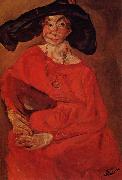Wholesale Oil Painting No Minimum |
|||||||||||
|
|
|||||||||||

|
|||||||||||
|
|
|
||||||||
Chaim SoutineChaim Soutine Art Locations Lithuanian 1893-1943 Soutine was born in Smilavichy near Minsk, Belarus (then part of the Russian Empire). He was the tenth of eleven children. From 1910?C1913 he studied in Vilnius at the Vilna Academy of Fine Arts. In 1913, with his friends Pinchus Kremegne and Michel Kikoine, he emigrated to Paris, where he studied at the Ecole des Beaux-Arts under Fernand Cormon. He soon developed a highly personal vision and painting technique. For a time, he and his friends lived at La Ruche, a residence for struggling artists in Montparnasse, where he became friends with Amedeo Modigliani. Modigliani painted Soutine's portrait several times, most famously in 1917, on a door of an apartment belonging to Leopold Zborowski, who was their art dealer. Zoborowski supported Soutine through the World War I, taking the struggling artist with him to Nice to escape the German bombing of Paris. In 1923, the American collector Albert C. Barnes visited his studio and immediately bought sixty of Soutine's paintings. Soutine once horrified his neighbours by keeping an animal carcass in his studio so that he could paint it (Carcass of Beef). The stench drove them to send for the police, whom Soutine promptly lectured on the relative importance of art over hygiene. In February 2006 this painting sold for £7.8 million to an anonymous buyer in London. Soutine produced the majority of his works from 1920 to 1929. He seldom showed his works, but he did take part in the exhibition of Independent Art held in 1937 in Paris, where he was at last hailed as a great painter. Soon thereafter France was invaded by German troops. As a Jew, Soutine had to escape from the French capital and hide in order to avoid arrest by the Gestapo. He moved from one place to another and was sometimes forced to seek shelter in forests, sleeping outdoors. Suffering from a stomach ulcer and bleeding badly, he left a safe hiding place for Paris in order to undergo emergency surgery, which failed to save his life. On August 9, 1943, Chaim Soutine died of a perforated ulcer. Soutine was interred in Cimeti??re du Montparnasse, Paris. |
||||||||
|
|
||||||||
Woman in Red
Woman in Red Painting ID:: 3765 |
1922
63.5 x 50.5cm
Private Collection
1922 63.5 x 50.5cm Private Collection |
|||||||
|
|
||||||||
|
Jozsef Rippl-Ronai Hungarian Painter, 1861-1927 After his studies at the highschool in Kaposvar he went to study to Budapest, where he got a degree in pharmacy. In 1884 he travels to Munich to study painting at the Academy. 2 years later he gets a grant and that makes him able to move to Paris and study by Munkacsy. In 1888 he meets with the members of Les Nabis and under their influence he paints his first important work The Inn at Pont-Aven, a very deep paining with dark atmosphere. His first big success was the paining My Grandmother (1894). Later he travels back to Hungary, first the critics does not accept him very warmly, but finally he celebrates a success with the exhibition Rippl-Ronai Impressions 1890-1900. He believes that for an artist there is important not only his work, but also how he lives and what he wears. That is why he becomes also a designer (Andrassy dining room and the window-pane in the Ernst Museum). His exhibitions in Frankfurt, Munich and Vienna have got a great success in 1911-1913. He paints his last big work in 1919 (portrait of his friend Zorka) and in 1927 dies in his villa Roma in Kaposvar. Woman in red mk229 1898 Oil on canvas |
||||||||
|
|
||||||||
|
Prev Next
|
||||||||
|
|
||||||||
|
Related Paintings to Jozsef Rippl-Ronai :. |
||||||||
|
|
||||||||
|
CONTACT US |

